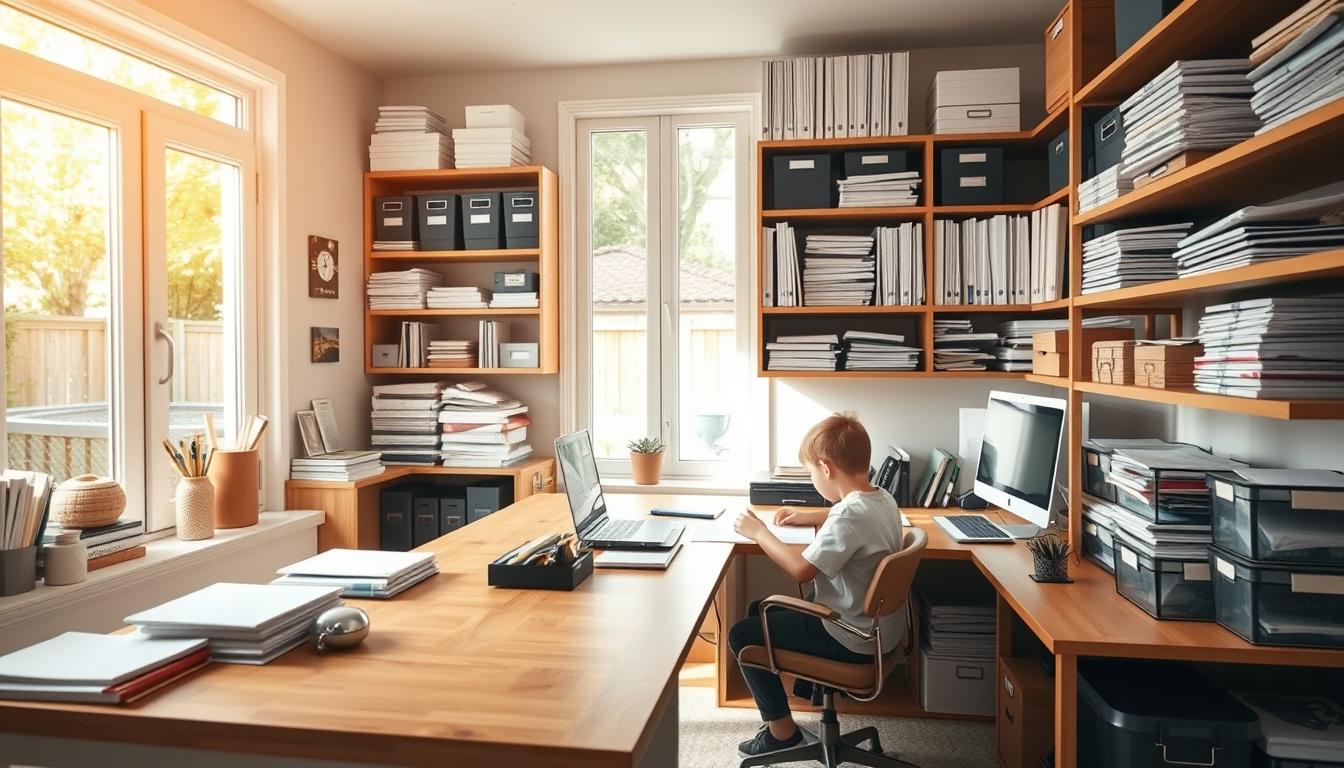Organize Kids’ School Papers at Home: Managing your child’s schoolwork and papers can feel overwhelming. But, with the right strategies, you can set up a system that suits your family.
Organizing your child’s papers does more than keep your home tidy. It also helps your kids develop good habits and a sense of responsibility. By using a few simple tips and tricks, you can keep your home clutter-free. Plus, your child’s important documents will be well-organized.
In this article, we’ll show you effective ways to manage your child’s school papers. This will make it easier for you to keep up with their assignments and projects.
Contents
- 1 The Paper Avalanche: Understanding the Challenge
- 2 How to Organize Kids’ School Papers at Home: Creating a System That Works
- 3 Sorting and Categorizing: What to Keep and What to Toss
- 4 Storage Solutions for Every Home and Budget
- 5 Maintaining Order Throughout the School Year
- 6 FAQ: Organize Kids’ School Papers at Home
- 6.1 How do I start organizing my child’s school papers?
- 6.2 What are some essential supplies I need to organize my child’s school papers?
- 6.3 How do I decide what papers to keep and what to toss?
- 6.4 How can I involve my child in the organization process?
- 6.5 What are some digital tools I can use to manage my child’s school papers?
- 6.6 How often should I maintain the organization system?
The Paper Avalanche: Understanding the Challenge
School papers, artwork, and assignments can quickly fill your home with clutter. Many parents struggle with managing school papers every day.
As the school year goes on, the pile of papers grows. You might feel overwhelmed by worksheets, artwork, and test scores. It’s not just about the clutter; it’s also about the emotional value of your child’s work.
The “paper avalanche” is more than just a lot of papers. It’s also about the memories attached to each one. Parents often keep every paper, fearing they’ll miss out on important memories.
But keeping every paper can make your home messy. It’s hard to find important documents in the clutter. Finding a balance between keeping memories and a clean home is key.
To solve this problem, you need a plan for managing school papers. Create a system that works for you and your child. It should help sort, categorize, and store papers in a way that fits your family’s life.
How to Organize Kids’ School Papers at Home: Creating a System That Works
Setting up a system to organize your kids’ school papers at home can change your family’s daily life. With some planning and the right strategies, you can keep your home neat. You also teach your kids how to organize.
Essential Supplies for Your Paper Command Center
You’ll need basic supplies to start. These include file folders, bins, labels, and a filing cabinet or drawer. Label makers help make clear, professional-looking labels.
Choose colorful bins and folders that your child will like. This makes organizing fun and engaging for them.

Picking the right spot for your child’s paper system is key. It should be easy for them to reach and in a busy area, like the kitchen or homework space.
Make sure the spot is also visible. This helps your child remember to keep their papers organized every day. [Organize Kids’ School Papers at Home]
Age-Appropriate Organization Tasks
It’s important to involve your child in organizing. Give them tasks that fit their age. Younger kids can sort papers into bins. Older kids can file papers or keep a homework log.
- For younger kids (ages 5-7): Sorting papers into categories.
- For older kids (ages 8-10): Filing papers and maintaining a simple homework tracker.
- For pre-teens (ages 11+): Managing a more complex filing system and organizing digital documents.
Making Organization Fun for Children
To keep your child interested, make organizing fun. Turn it into a game by setting timers or creating a reward system. This encourages them to keep their papers organized.
Organizing together as a family teaches your child important skills. It also gives you quality time together. This helps your child learn responsibility and order.
Sorting and Categorizing: What to Keep and What to Toss
Managing school papers starts with sorting and categorizing. You need to figure out what to keep and what to throw away. This helps you decide which documents are important.
Action Items (Homework, Permission Slips)
First, find action items like homework and permission slips. These need your attention right away. They are urgent and should be handled quickly.
Reference Materials (Schedules, Curriculum Guides)
Then, sort reference materials like school schedules and guides. These are useful all year and should be easy to find. [Organize Kids’ School Papers at Home]
Some papers are keepsakes, like your child’s special projects. Choose a way to keep these memories, whether in a box or on a digital platform.
Recyclables (Everything Else)
Lastly, find papers to recycle or throw away. This includes junk mail and other unnecessary documents. It helps keep your space tidy.
Apps and Tools for Digital Paper Management
Think about using digital tools to manage your child’s schoolwork. Apps can help reduce paper clutter and make documents easy to find.
By sorting and organizing school papers, you’ll clear clutter. This makes a better space for your child to succeed. [Organize Kids’ School Papers at Home]
Storage Solutions for Every Home and Budget
After sorting and categorizing your child’s school papers, it’s time to find a storage solution. It should fit your home and budget. Good storage keeps things organized and makes papers easy to find when needed.
File Folders and Inbox Systems
File folders are a simple and affordable way to store papers. Label them by category, like subject or date, and store them in a drawer or on a shelf. Inbox systems help manage daily or weekly papers, keeping them tidy and preventing clutter.
If you have little desk or shelf space, consider wall organizers and bulletin boards. They let you keep important papers visible and within reach. Use them for artwork, reminders, or important documents.
Memory Boxes and Portfolio Solutions
For keepsake papers, like artwork or special projects, memory boxes or portfolios are great. They protect and organize cherished items. Choose decorative boxes or professional organizers designed for this purpose.
Digital Archives and Cloud Storage
In today’s digital world, digital storage is a smart choice. Scanning papers and storing them digitally saves space and makes them easy to share and access. Use cloud storage services that are safe and work on different devices.
By choosing the right storage solution, you can keep your home clutter-free. Your child’s school papers will stay organized. Whether you prefer physical or digital storage, there’s a system that fits your family’s needs.
See Also: 11 Year Old’s Morning Routine: Tips to Start the School Day Right
Maintaining Order Throughout the School Year
Setting up a system to organize kids’ school papers at home is crucial. It helps manage the endless homework and projects. Make sure to check and update your system every week.
Getting your child involved in organizing their papers is beneficial. It teaches them important skills and instills a sense of responsibility. As you improve your homework organization, it will become a regular part of your day.
With some effort, you can keep your home tidy and teach your child lasting habits. By following the tips on organizing kids’ school papers, you’re on the path to a stress-free school year.
FAQ: Organize Kids’ School Papers at Home
How do I start organizing my child’s school papers?
What are some essential supplies I need to organize my child’s school papers?
How do I decide what papers to keep and what to toss?
How can I involve my child in the organization process?
What are some digital tools I can use to manage my child’s school papers?
How often should I maintain the organization system?

Hi, I’m Waverly Moon, creator of TipsToFeelBetter.com. This blog is for practical moms and family-focused women seeking simple, realistic ways to improve daily life. From home routines to self-care, I share tips that truly work—because life doesn’t need to be perfect to feel better. Let’s make everyday moments a little easier, together.

